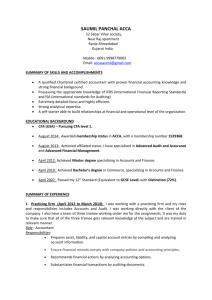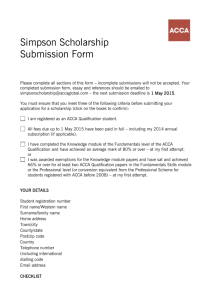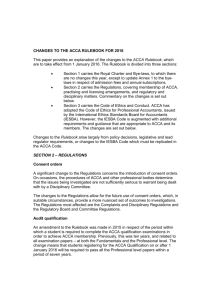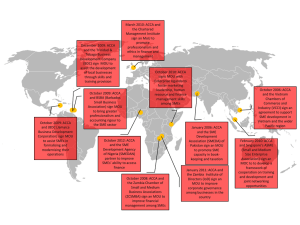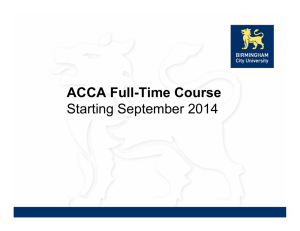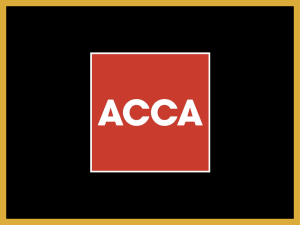Transitional Regulatory Board
advertisement
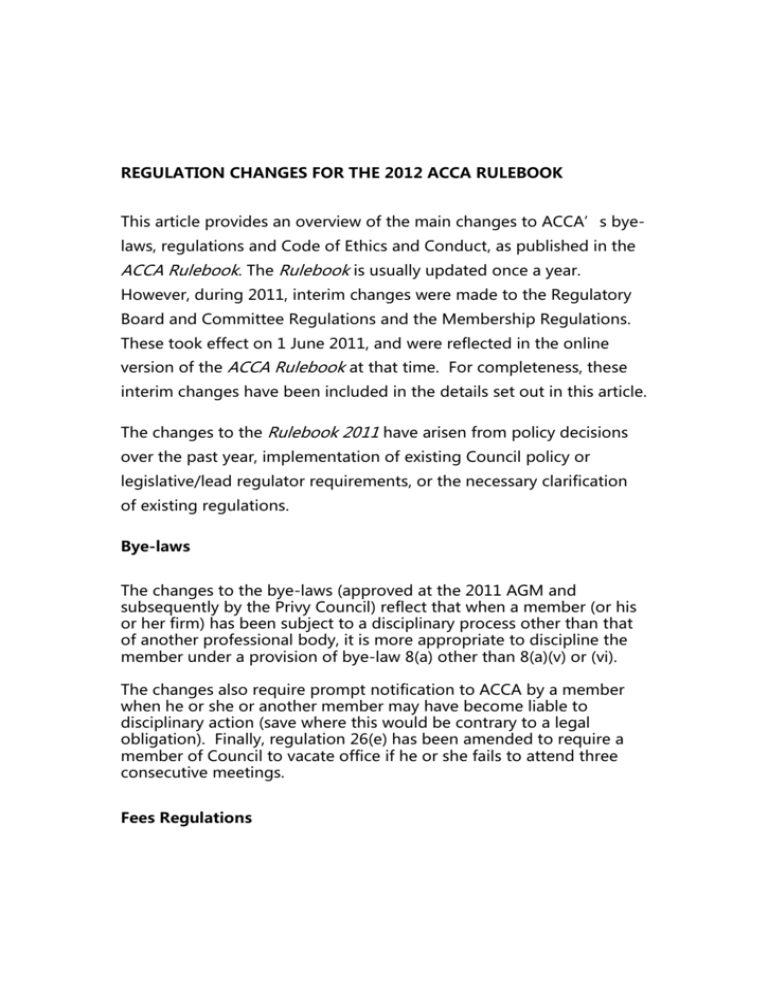
REGULATION CHANGES FOR THE 2012 ACCA RULEBOOK This article provides an overview of the main changes to ACCA’s byelaws, regulations and Code of Ethics and Conduct, as published in the ACCA Rulebook. The Rulebook is usually updated once a year. However, during 2011, interim changes were made to the Regulatory Board and Committee Regulations and the Membership Regulations. These took effect on 1 June 2011, and were reflected in the online version of the ACCA Rulebook at that time. For completeness, these interim changes have been included in the details set out in this article. The changes to the Rulebook 2011 have arisen from policy decisions over the past year, implementation of existing Council policy or legislative/lead regulator requirements, or the necessary clarification of existing regulations. Bye-laws The changes to the bye-laws (approved at the 2011 AGM and subsequently by the Privy Council) reflect that when a member (or his or her firm) has been subject to a disciplinary process other than that of another professional body, it is more appropriate to discipline the member under a provision of bye-law 8(a) other than 8(a)(v) or (vi). The changes also require prompt notification to ACCA by a member when he or she or another member may have become liable to disciplinary action (save where this would be contrary to a legal obligation). Finally, regulation 26(e) has been amended to require a member of Council to vacate office if he or she fails to attend three consecutive meetings. Fees Regulations The changes to the regulations reflect the 2012 membership fee, which is £197. Membership Regulations The principal amendments to the Membership Regulations are as follows: Following the decision of the Chartered Institute of Management Accountants (CIMA) to leave the Consultative Committee of Accountancy Bodies (CCAB), automatic entitlement of members of CIMA to ACCA membership has been removed, together with the ability of CIMA members who are ACCA students to undertake public practice activities. The meaning of ‘book-keeping’ and the permitted activities of ACCA students have been clarified, including the entitlement of ACCA students who are licensed insolvency practitioners to undertake insolvency work. The Practical Experience Requirement (PER), set out in appendix 2 to the regulations, has been clarified to say that it must involve 36 months’ work experience in one or more accounting and financerelated roles. A definition of ‘workplace mentor’ has been provided. At the start of 2011, ACCA launched its new suite of entry-level qualifications known as ‘Foundations in Accountancy’ (‘FIA’). The Mature Student Entry Route (MSER) is no longer available, and the last paper exam session for MSER students was in June 2011. Therefore, interim amendments to the Membership Regulations were necessary to reflect the fact that, since January 2011, students are being registered to a new suite of qualifications called ‘Foundations in Accountancy’, which includes the Certified Accounting Technician (CAT) qualification, but also other entry level and ACCA feeder qualifications. These interim changes also included: amendments to recognise the new practical experience requirement for CAT called Foundations in Practical Experience Requirement (FPER). Finally, interim changes were required in respect of the name of paper P1, which has been changed from ‘Professional Accountant’ to ‘Governance, Risk and Ethics’. This change was made to reflect feedback from employers that they require accountants with a better appreciation of risk management. The change also reflects increased content in respect of risk in this syllabus since June 2011. Global Practising Regulations The substantive change to the Global Practising Regulations allows non-accountants to act as continuity nominees in respect of some activities, such as insolvency work. Global Practising Regulations – Annexes 1 to 4 The substantive amendments to Annexes 1 to 4 to the Global Practising Regulations: clarify that a licensed insolvency practitioner in the UK is in public practice, and so a member who holds an insolvency licence from another professional body must hold an ACCA practising certificate require a member applying for an audit qualification in the UK, Ireland or Cyprus on the basis of audit experience or a certificate obtained some time ago to demonstrate relevant recent audit experience and CPD, or undergo appropriate audit training align the European annexes with the requirements of the European Statutory Audit Directive and the other Recognised Qualifying Bodies in that only two of the three years of practical training for the audit qualification need to be under the supervision of a statutory auditor allow the Admissions and Licensing Committee to exercise discretion with regard to the practical training requirements for the audit qualification in the UK, Ireland and Cyprus, so long as such discretion is limited to that permitted by legislation and any relevant lead regulator reflect the minimum professional indemnity insurance requirements in the UK and Ireland for firms wishing to conduct insurance mediation activities achieve consistency with the Membership Regulations regarding CIMA members who, from 1 January 2012, will not be automatically entitled to ACCA membership. Global Practising Regulations – Australian Annex The Australian Annex to the Global Practising Regulations is a new Annex, brought about as a result of ACCA achieving recognition by the Australian Tax Practitioners Board (TPB). The TPB allows its registrants to undertake tax and business activity statement (BAS) agent services. Annex 5 (approved by the TPB) sets out the requirements of ACCA members who wish to undertake tax and BAS agent services, and reflects the TPB’s ‘good fame, integrity and character’ requirement. Irish Investment Business Regulations The only substantive amendment to the Irish Investment Business Regulations is to reflect the change in the name of the investment business lead regulator in Ireland (now the Central Bank of Ireland) brought about by the Central Bank Reform Act 2010. There are corresponding amendments in the Regulatory Board and Committee Regulations, the Authorisation Regulations, the Irish Annex to the Global Practising Regulations, and section 270 Custody of client assets of the Code of Ethics and Conduct. Regulatory Board and Committee Regulations The substantive changes to the Regulatory Board and Committee Regulations better reflect the way in which the Regulatory Board is appointed by Council, and how Committees are established and appointed. They also clarify how the Disciplinary Committee’s general powers interact with its specific powers. In addition, an interim change was effected in order to ensure efficient continuity of an effective and independent Regulatory Board. The terms of office of all the lay members of the Regulatory Board expired in September 2011, and so, to aid succession planning, future appointments will be made such that one-third of the six lay members of the Board will retire, in rotation, each year. Amendments to the Regulations were required to facilitate the issue of contracts to members of the Regulatory Board for terms shorter than three years. Authorisation Regulations The substantive changes to the Authorisation Regulations provide that the Admissions and Licensing Committee may only order that a hearing proceed at short notice if it is of the view that it is in the public interest to do so. Also, the Committee may exclude from any hearing any person (including the applicant) whose conduct is likely to disrupt the orderly conduct of the proceedings. Complaints and Disciplinary Regulations The substantive changes to the Complaints and Disciplinary Regulations: provide a definition of ‘finding’ and amend the definition of ‘order’ accordingly separate interim orders from conditions imposed on an adjournment, and clarify that conditions imposed on an adjournment cannot be appealed set out the effective dates of interim orders and conditions imposed on an adjournment clarify the regulations relating to publicity, in light of the new definition of ‘finding’, and in respect of conditions imposed on an adjournment allow the Disciplinary Committee to add alternative allegations, as well as make amendments to allegations, where allegations are defective enable the Chairman, under certain conditions, to correct errors without a further hearing enable the Disciplinary Committee to exclude disruptive individuals from hearings (including members from their own hearings) incorporate the requirement that the Disciplinary Committee indicates the facts on which its findings are based before the member is invited to make submissions on mitigation and sanction allow for suspension of membership or registered student status at a health hearing formally delegate to investigating officers the obligations of the Secretary to lay a complaint before the relevant committee or individual if the Secretary is of the opinion that the complaint ought to be investigated by that committee or individual. Appeal Regulations As with the Complaints and Disciplinary Regulations, the changes to the Appeal Regulations provide a definition of ‘finding’ and amend the definition of ‘order’. Other substantive changes: make separate regulations in respect of Disciplinary Committee and Admissions and Licensing Committee appeals, because a ‘finding’ can only relate to a Disciplinary Committee hearing specify what needs to be included in the appellant’s grounds for requesting the Appeal Committee to reconsider an application notice provide a procedure for ensuring timely notification to ACCA if the appellant wishes the Appeal Committee, at a full appeal hearing, to reconsider some grounds of appeal in relation to which permission was refused by the Chairman provide the Appeal Committee with the option to rescind findings as well as orders clarify the regulations relating to publicity. Code of Ethics and Conduct Descriptions of professional accountants and firms and the names of practising firms – Section B4 The change to this section clarifies that ethical requirements in respect of ‘stationery’ apply to websites and other electronic communications. Professional liability of accountants and auditors – Section B9 The proposed change incorporates the model rule, encouraged by the Ministry of Justice, in respect of paid trustees and trust draftsmen, whereby if the trust document is to include a ‘trustee exemption clause’, the member has a duty to take reasonable steps to ensure that the person creating the trust is aware of the meaning and effect of the clause. ACCA’s Rulebook can be viewed on ACCA’s website at: http://www2.accaglobal.com/members/professional_standards/rules_st andards. Ian Waters ACCA
